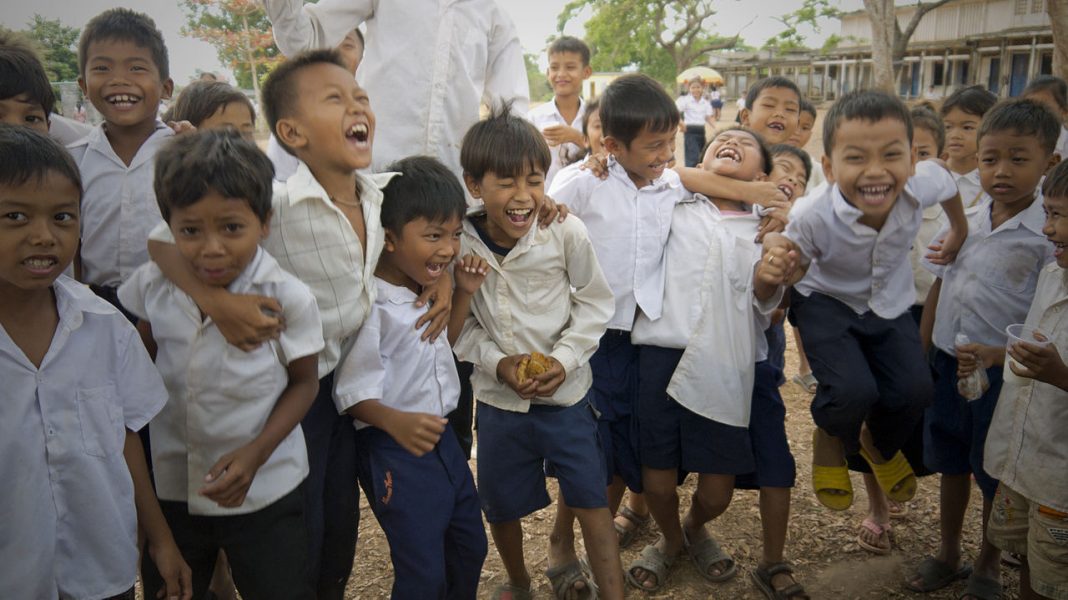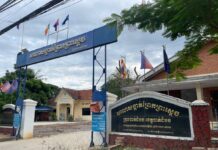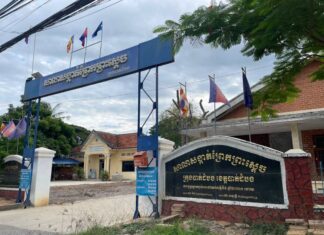Many schoolchildren in Phnom Penh are finding it hard to speak Khmer correctly after going to English-language schools, some parents said.
Their proficiency in a foreign language should give them a leg up in future careers, but for some it also hints at a troubling trend: Surrounded by YouTube videos and social media sites in English, a generation could be drifting away from Cambodia’s national language.
Chan Sarem, who has three daughters, said her youngest 12-year-old doesn’t like using Khmer, and when she speaks the language her pronunciation is unclear and sounds like a foreigner.
“She calls me ‘mom’ instead of the Khmer style” of using the word Mae, Sarem said. “Sometimes, she speaks English with her sisters when they don’t want me to understand. It makes me feel left out.”
Her older daughters, who are 22 and 24, don’t have the same problem.
But the youngest, who started at an English school when she was 6, is growing up preferring to use English over Khmer, she said.
La Vannsotheavuth said his 5-year-old son started at an English kindergarten when he was 3, and, surrounded by friends who speak English and YouTube videos also in the foreign language, he was having some difficulty pronouncing Khmer.
Vannsotheavuth therefore needed to make an extra effort to teach Khmer at home, he said.
He would have preferred that his son attend a Khmer school, but he knew that learning English would help his son get a better job in the future, so reluctantly sent him to the English kindergarten, he said.
He saw the same situation happening to many children around him, he said. “I often see many parents speak English to their children, even though they are Cambodian. The children cannot use the Khmer language correctly.”
Vannsotheavuth said he found the situation concerning. “For me, I am a patriotic person so I think about the future of our culture and language, how it can affect the value of our history, the loss of a sense of belonging, the usage of the Khmer language — especially, the possible disappearance of this language.”
Another parent, Thun Navy, a sales manager with two young children, said his eldest, a 3-year-old girl, learns only English and Chinese at kindergarten, and always mixes Khmer and English when she speaks.
“My child uses English mixed with Khmer, but it’s not my intention to make my child speak English better than Khmer,” he said.
However, the best schools, especially for younger children, teach in foreign languages, so he sent her to a private school rather than a public Khmer school, he said.
“It’s because there are not many public schools that accept kids under 4 years old, and private schools have more programs for students,” he said.
Chry Pengchhy, part-owner of an English school in Pur Senchey district, acknowledged that it was a common trend for many children to become better at foreign languages than Khmer.
Some parents even prefer to speak foreign languages with their children at home, he said.
“Today’s use of the Khmer language has really changed, from my observations of each family. Most parents speak foreign languages to their children based on [the parents’ own] ability,” Pengchhy said.
He agreed that Khmer writing, speaking and listening skills were declining among the new generation, and the government and parents should step in to improve the situation.
“Firstly, the state must limit the age when students can start to study a foreign language and should prioritize the national language first. Secondly, parents need to use and teach their children Khmer more.”
Education Ministry spokesman Ros Soveacha would say only that parents were free to choose where to send their children, and the ministry was working to improve education at all levels, from kindergarten through to the university level.
English lessons were added to the Khmer public school curriculum in 1996 starting from Grade 7, and were expanded to start at Grade 4 from 2017, according to the Phnom Penh Post.
Khmer Literature scholars said the trend among schoolchildren was concerning for the future of the Khmer language.
Chhin Seyha, a member of the language commission at the Royal Academy of Cambodia and a Khmer Literature trainer at Pannasastra University, said many Cambodians already do not use the Khmer language well, as they seem to value foreign languages more than Khmer.
“I see that using foreign languages rather than the Khmer language leads to a deficit in the Khmer language, leads to a lack of a lot of words in use, leads to the loss of identity, leads to younger generations having a crisis of writing,” Seyha said.
He suggested a variety of policies to promote Khmer, including prioritizing Khmer at schools, establishing a national independent authority on the language, and even penalizing people who write Khmer incorrectly.
Choub Sokleab, a 29-year-old fourth-year student majoring in Khmer Literature at Preah Sihanouk Raja Buddhist University, said that incorrect Khmer grammar and spelling was becoming more common, especially online.
“In our society nowadays, on Facebook and other media, children in Phnom Penh and the provinces use Khmer language in a limited way. Their usage of the Khmer language is wrong according to Khmer rules; they do not write well, and are wrong in both grammar and spelling,” Sokleab said.
He said it was even possible that the Khmer language would become a second language for some Khmer youths, who already write Khmer using the Latin alphabet when communicating with each other digitally.
“I think that if we continue to urge children to learn foreign languages much more than our Khmer language, it will become a second language,” he said. “New generations in the 21st century are likely to mostly use foreign languages.”












